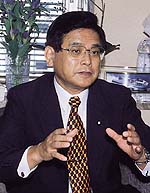Sorimachi:
What are some of points of consideration in the
course of judicial system reform?
|
Yasuoka:
We first must scrutinize the judicial systems of other
nations including their cultural foundations, while we thoroughly review and
analyze our own judicial system and culture, extracting its specific
characteristics. We have long retained a so-called 'spirit of harmony' by
which we always try to reach a mutually agreeable consensus, eliminating
unnecessary conflicting elements in order to reach humane peaceful
solutions. This approach has both good and bad sides. In our traditional
system, individual rights tend to be ignored under the guise of collective
values where priority is always placed on organizations and issues are
handled confidentially without clear accounting for individual inspection.
While the positive elements should be preserved, the search for new system
should also shed light on the defects without hesitation. Another important
task is to look at the direction toward which both Japan and the world are
heading, and become aware of the chang!
es this will necessitate.
Sorimachi:
Is that an effort to extract fundamental
concepts and theoretical cohesion in pursuance of scrutiny and analysis?
|
Yasuoka:
In the past, we have undergone certain periods of
fundamental societal change; the Meiji Restoration and efforts to develop a
modern nation state, and building a democratic nation out of ashes right
after World War II. Today is comparable to those crucial periods. The West
has been so far the model from which we have learned, but not anymore. Yet,
we have found no clear guide in sight. We must develop our objectives and
ideas ourselves. This is the role of Judicial Reform Council as well. We
need a leading concept, ideas and direction when we walk into the unknown
future. Where should a new Japan go? What should be the governing
principles and what is the best judicial framework in the world? The answers
must come from within us. We can't leave this task to bureaucrats. This is
an issue the people must face. The people must take political leadership,
with input from various professionals. This should be the will of the
people.
Sorimachi:
Tremendous task, isn't it?
|
Yasuoka:
Two years is not long enough for this task. But we have
created an additional sub-committee under the Judicial Committee of the
House of Representatives where a variety of deliberations may be actively
carried out. There are special committees, too. Other political parties have
their own respective task forces that can contribute to this issue. We
should mobilize every possible method such as public hearings, symposiums,
etc. in gathering views and input from the people.
Sorimachi:
The LDP certainly has to play crucial role.
|
Yasuoka:
We established two panels in an attempt to conduct
concentrated deliberations in drafting the report, Definitive Guidelines
for a 21st Century Judicial System. Views and proposals were also collected
from various sectors and the people from a national cross section. It is my
plan to let the party investigative body establish a number of review groups
headed by certain individuals promoting judicial reform effort. Through
such efforts, I expect to have additional opportunities to listen to the
views of the people.
Review groups may be organized on such issues as
- the further improvement of legal aid,
- legal protection over intellectual property,
- reform of legal culture and the judicial system,
- higher education and legal education and
- sampling cases and practices on ADR (conflict resolution outside the court ) in Asia in general and collaboration.
At any rate, we will welcome any suggestion in organizing
these groups and the issues to be handled from all parties concerned.
Categorically, a new format may be warranted as well, which we would seek
not only from the LDP but also through discussions throughout a wide public
sector. In seeking an ideal judicial system, the effort must be flexible
enough to meet the needs of a changing world, and this can be only done if
we work closely and together with the people.
Sorimachi:
Thank you very much.
|

 |
Member of the House of Representatives
Okiharu Yasuoka
Mr. Yasuoka was born May 11, 1939. He passed the National Bar Examination
as the nineteenth trainees after graduating from the Faculty of Law, Chuo
University. He served as a judge and became a member of the House of
Representatives in 1972. Now he is in his eighth term as the representative
from the first constituency of Kagoshima Prefecture. While a member of the
House, he worked for the National Land Agency and served as Parliamentary
Undersecretary of the Ministry of Finance, the Chairman of the Committee on
Construction, the Chairman of the Special Committee on Relocation of the
National Diet and Related Organizations, Administrative Director of the
Committee on Finance and Chief Director of Special Committee on Financial
Stabilization. Within Liberal Democratic Party (LDP), he served as Deputy
Secretary General of the LDP for four consecutive terms, Chairman of the
Committee on Planning Administrative Reform Promotion, Chairman of Finance
Committee and General Deputy!
Chairman of Research Council.
Present Primary Posts (for ruling Liberal Democratic Party):
Chairman, Sub-committee on Revising the Commercial Code
Chairman, Special Research Committee to Promote the
Comprehensive Plan for Financial Revitalization
Secretary, Research Commission on the Tax System
Chairman, Special Research Commission on Rented House Right
Acting Chairman, Education Reform Implementation Headquarters
Acting Chairman, Research Commission on the Constitution
Achievements:
Proposed a bill (passed into a law) to promote the
traditional arts and crafts industry, aimed at cherishing Japanese culture
and tradition.
Proposed revision, to the Commercial Code (enacted); one
legalizes the stock- option system for company executives and employees and
the other deregulates rules to write off buyback stocks.
Proposed and amends the Civil Execution Law, etc.
Drafted "Proposal to Promote Educational Reform" and works to
reform education.
Formulated a "comprehensive plan to augment the liquidity
of structured finance," and is working toward its materialization.
|
|
